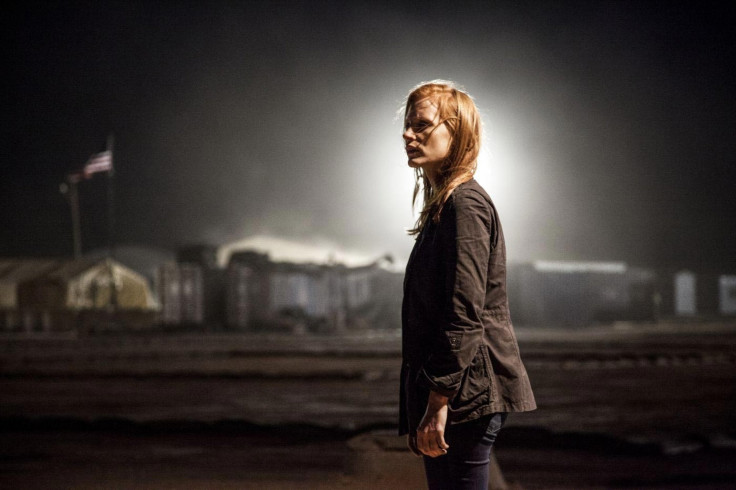Did ‘Zero Dark Thirty’ Use The Final Phone Call Of A 9/11 Victim Without Permission?

The Oscars are over, but the snubs keep coming for “Zero Dark Thirty.”
Kathryn Bigelow’s controversial how-we-got-Osama drama is taking heat from a still-grieving mother of a 9/11 victim whose last words were used in the film -- without her permission, she says. The New York Daily News reports that Mary Fetchet, a Connecticut woman, is “shocked” that the filmmakers never contacted her to ask to use an audio clip of a phone call her son Bradley made from an 89th-floor office in the South Tower of the World Trade Center on Sept. 11, 2011. Bradley, a 24-year-old equities trader, died in the fateful terrorist attack along with nearly 3,000 other people.
“Zero Dark Thirty,” which dramatizes the U.S. government’s decade-long manhunt for al- Qaeda founder Osama bin Laden, begins with a black screen and an audio montage of real-life phone calls made by people trapped in the World Trade Center shortly after they were struck by airplanes. Among the voices heard is Bradley Fetchet’s, who made a final phone call to his family’s answering machine.
“Could you imagine going to a film that had a loved one who had died at the hands of terrorists and hearing the voice of that person and not knowing you were going to hear it,” Fetchet told the Daily News. “I was shocked that I hadn’t been contacted to be asked for my permission to use Brad’s recording.”
“Zero Dark Thirty” is not the first movie to feature 9/11 victims’ phone calls, many of which have been released to the public. The TV-movie “9/11: Phone Calls from the Towers,” which aired in the UK in 2009, assembled many private messages and recorded phone calls. According to IMDb, the movie also features audio from Bradley Fetchet, who even has his own IMDb profile in connection with the movie.
Mary Fetchet told the Daily News that she has granted permission to use the audio clip in other instances, adding that other media outlets have always asked for her permission first.
It’s not clear whether the audio clip used in “Zero Dark Thirty” was the same audio from the Fetchets’ answering machine, nor is it clear whether the filmmakers attempted to contact the Fetchets to ask for permission. A request for additional information was not immediately returned by the film’s distributor, Sony Pictures Entertainment. It’s worth noting, however, that the Fetchets would not have been too difficult to find. Mary Fetchet and her husband, Frank, have been quite visible since 9/11, including setting up a memorial foundation in Bradley’s name. Mary Fetchet is also the founding director of Voices of September 11th, which offers support and guidance to 9/11 families.
Whether or not Mary Fetchet could bring a successful legal case against the filmmakers is hard to say, but legal options in situations such as this are tricky.
“Generally, U.S. copyright law protects ‘original works of authorship’ that are fixed in a tangible form of expression,” said Gano Lemoine, a Los Angeles-based entertainment attorney. “Copyright law typically does not protect ‘improvisational speeches’ that have not been written or recorded. It is possible that the recording of Bradley Fetchet’s phone call from the World Trade Center was a copyright-protectable work, which would allow the copyright holder to prohibit its use without permission.”
But that right to prohibit use can be waived, Lemoine said, if the owner fails to take appropriate actions to preserve the copyright. In Fetchet’s case, the Daily News article noted that she “shared the [audio] message in past scenarios, including with the 9/11 Commission.”
“It may be that by providing her recording of her son’s message to government investigators and others, she may have unwittingly put the recording of her son into the public domain,” Lemoine added, “thereby losing any legal right to enjoin the filmmakers from using the audio, or otherwise seek damages.”
Lemoine added that he sympathizes with Fetchet, and acknowledged that a legal analysis of her rights seems cold in light of her obvious -- and understandable -- emotional distress.
Since its release in December, “Zero Dark Thirty,” while praised by critics, has earned a barrage of criticism over its depictions of torture and accusations that the filmmakers were granted inappropriate access to classified documents. It is widely believed that the controversy hurt the film at the Academy Awards this year. The movie was nominated for five Oscars, including Best Picture, but took home only one -- an Oscar for Best Sound Editing, which it shared with the James Bond movie “Skyfall.”
Mary Fetchet told the Daily News that she did not object to the movie being made, only that the filmmakers “took the liberty” of using the audio clip without contacting her.
Got a news tip? Send me an email. Follow me on Twitter: @christopherzara
© Copyright IBTimes 2024. All rights reserved.






















